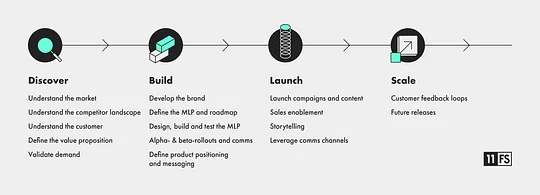Most people don’t know what product marketing is

Fintechs can’t hire product marketers quick enough at the moment. If you’re new to the marketing game and looking to become a specialist rather than a generalist, then it’s probably one of the most interesting areas to specialise in right now.
It’s one of the fastest growing areas of marketing, one of the most in-demand areas of marketing and also one of the least understood areas of marketing - in the greater scheme of things, it’s pretty new as a standalone marketing function.
But what is product marketing??
The Product Marketing Alliance define product marketing as “the driving force behind getting products to market - and keeping them there. Product marketers are the overarching voices of the customer, masterminds of messaging, enablers of sales, and accelerators of adoption. All at the same time.”
And Hubspot will tell you it’s ”the process of bringing a product to market. This includes deciding the product's positioning and messaging, launching the product, and ensuring salespeople and customers understand it. Product marketing aims to drive the demand and usage of the product.”
All of these definitions talk about go-to-market and messaging. But don’t make the mistake of thinking it’s the last step in a product creation process. Don’t confuse product marketing with marketing communications as a trigger when you’re ready to launch.
As with all things product, it starts with the customer. That means just like product strategy, management and design, the marketer’s role starts at the beginning of the process - they don’t just parachute in at the end.
As with all things product, it starts with the customer.
And what does this process look like?
If you think of the product creation process as consisting of four key phases - discover, build, launch and scale, then product marketing will play a role across all of those.
That means there’s an area of crossover on pricing, go-to-market, customer research, etc. that several teams need to feed into.
Some of the best product people - that’s product designers, product strategists, product managers, product delivery managers, product marketers - thrive in the collaboration, that shared ownership. Where everyone brings their expertise, their passions, and together a great product is built and a customer problem solved.
Product marketing will either own or be involved in all of these steps across the product lifecycle.

Is product marketing part of marketing or part of product management?
In a business where team KPIs are aligned and roles are defined with clear accountability, I’d ask whether it really matters. Back in 2020, Tessa Pettman described how her product marketing managers are embedded in product teams on our Fintech Marketing Podcast, and there are various other models.
But whether they sit in marketing and align with the product teams, or sit in the product teams and have an oversight from marketing, it really doesn’t matter.
But whether they sit in marketing and align with the product teams, or sit in the product teams and have an oversight from marketing, it really doesn’t matter.
But isn’t product just a subset of marketing?
The marketing purist in me can’t help going back to Philip Kotler’s four Ps: Price, Product, Promotion, Place.
True strategic marketing factors all these things into the strategy. Price is not defined, tested and set separately from the distribution strategy, from the promotion and brand strategy, from the product strategy.
In tech businesses, it’s common to have separate dedicated product teams, but whether they sit under the CMO or whether there’s a board/exec level CPO role really depends on whether the business is marketing-led or sales-led. Or product-led or brand-led.
According to The Org, Facebook’s CPO and CGO both sit at the top level. Same with Netflix and Stripe.
But at Apple, marketing sits at the top level and product is embedded in the business units. Same with Google and Microsoft.
Interestingly, the financial incumbents like Goldman Sachs and Wells Fargo seem to have both product and marketing embedded in their business units. You can’t help but wonder about the impact that has on creating silos. How do they manage the customer from a single perspective with an overall product and marketing strategy?
What does a good product marketing manager look like?
The mindset matters as much as the skillset.
Successful product marketers have a mindset of openness, curiosity and collaboration. They’re not precious, closed-minded or possessive.
They thrive in that grey area where the lines of responsibility - but not accountability - sometimes get blurred. Where collaboration trumps individual contributions, where everything revolves around learning about the customer, not opinions or fixed mindsets.
They thrive in that grey area where the lines of responsibility - but not accountability - sometimes get blurred.
But regardless of the org structure, and where product or product marketing sits, good product marketers will:
Know their market inside out - competitors, trends, opportunities - and feed these insights back to your team.
Know their customer - understanding what customer problems you’re solving for, and having continuous feedback loops through surveys, product usage data, A/B tests, etc. will help shape the product roadmap. You’re feeding insights back to the product team and working closely with the CRM and comms side of your marketing team to engage customers at different lifecycle stages. And whether you’re a fan of personas or not, sharing some form of customer profile will give them focus.
Understand their product inside out, the technical aspects as well as the use cases.
Support product managers by working to tell the product story - even very early on, you could shape the positioning and story by doing things like writing a mock press release to articulate how the product will be described when it launches. It helps to focus efforts on elements of the product that are differentiated and will help you win.
Think commercially - be the voice of revenue in the marketing team. If you’re solving real customer problems then revenue will follow. Start with the customer but don’t be afraid to speak for product success and revenue. Marketing’s role is ultimately to drive growth of the business.
It’s an exciting time to work in product marketing, and if you stay strategic and focused on the customer, then you can’t go wrong.



